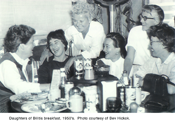 |
||||
| Still from No Secret Anymore: The Times of Del Martin and Phyllis Lyon (dir. Joan E. Biren, 2003). Used with permission from Bev Hickock. | ||||
|
||||
Journal Issue 3.1
Spring 2011
Edited by Agatha Beins, Deanna Utroske, Julie Ann Salthouse, Jillian Hernandez, and
Karen Alexander
Editorial Assistants: Mimi Zander and A.J. Barks
Living with Pride: Ruth C. Ellis @ 100. Directed by Yvonne Welbon. Ho Ho Kus, NJ: Sisters in the Life, 2000.
No Secret Anymore: The Times of Del Martin & Phyllis Lyon. Directed by Joan E. Biren. San Francisco: Frameline, 2003.
Golden Threads. Directed by Lucy Winer and Karen Eaton. New York: Wildlight Productions, 1999.
Reviewed by Julie R. Enszer
Yvonne Welbon is an expert filmmaker and Living with Pride: Ruth Ellis @ 100 (60 min.) demonstrates her attention to the art and craft of filmmaking and her commitment to telling stories too often not captured for the screen.1 The life of Ruth Ellis, an African-American lesbian born July 23, 1899, is one such story. Extensive interviews with Ellis form the core of this film; Welbon also weaves archival images, interviews with friends of Ellis, and dramatic re-creations of Ellis’s experiences to create an engaging hour of cinema.
Ellis was born and raised in Springfield, IL, the youngest of four children. Welbon contextualizes Ellis’s recollections about her parents, both born in the 1860s, with photographs, newspapers from that time, and archival film clips. Particularly compelling is Ellis’s account of riots in 1908 in Springfield when a “mob of whites attacked Colored citizens” and looted “Colored and Jewish owned businesses.” This riot was a catalyst for the formation of the NAACP.
Ellis fell in love with her gym teacher while in high school and met her long-time partner, Ceciline “Babe” Franklin, in the 1930s; they lived together for nearly thirty-five years. “Babe” and Ellis moved to Detroit in 1937, and in 1941 they bought a house that became a social center for African-American lesbians and gay men until 1971. Ellis worked as a typesetter and later owned a print shop in northeast Detroit. Ellis’s stories about the lesbians and gay men of Detroit who frequented her house and attended her Saturday night parties, combined with the dramatic reenactments filmed by Welbon, provide an exciting account of one aspect of African-American lesbian/gay history.
Throughout the documentary Ellis shines not only as a warm person, but also as a proud lesbian. She discusses her “one night stands,” desires for “stout women” with “lovely breasts,” and her last sexual encounter at the age of ninety-five—in her words, “it takes a little longer.” Welbon captures many people who gather around Ellis later in her life in Detroit to provide support, transportation, and camaraderie. Ellis is to this community—this family—a source of inspiration. Although the film’s conclusion, a message to young people to participate in the lives of older people, is a bit didactic for my taste, this is a wonderful film for classroom use; in tracing the life of Ellis, it speaks to the power of community.2
No Secret Anymore (57 min.) tells a history of organizing for lesbian rights in the United States during the twentieth century through the lives of Phyllis Lyon and Del Martin. The accomplishments of Lyon and Martin are legion. Together and individually, they were involved in starting and sustaining over a dozen organizations, including the Daughters of Bilitis, Citizens Alert, the National Sex Forum, the San Francisco Women’s Center, the Bay Area Women’s Coalition, the California Coalition against Domestic Violence, and the National Lesbian Feminist Organization. They coauthored the book Lesbian/Woman (Volcano, 1991), and most recently advocated for the inclusion of lesbians and gay men at the White House Conference on Aging. No Secret Anymore highlights the years of Martin and Lyon’s shared activism and their reflections on their ability to sustain their activism; equally important, it contextualizes Lyon's and Martin’s lives with the history of struggles for civil rights and human rights in the United States from the 1950s until the early 2000s.
1 Welbon’s first film, Monique (1991), is an autobiographic film about a young girl’s encounter with racism. Other films include The Cinematic Jazz of Julie Dash (1993), Remembering Wei Yi-fang, Remembering Myself. . . (1995), and Sisters in Cinema (2003). For a complete filmography, see: http://www.sistersincinema.com/filmmakers/ywelbon/filmography.html.
2 Appropriate reading to consider with this film includes two articles by Rochella Thorpe, “'A house where queers go': African-American Lesbian Nightlife in Detroit, 1940-1975” in Inventing Lesbian Cultures in America, ed. Ellen Lewis (Boston: Beacon, 1996), 40-61 and “The Changing Face of Lesbian Bars in Detroit, 1938-1965” in Creating a Place for Ourselves: Lesbian, Gay, and Bisexual Community Histories, ed. Brett Beemyn (New York: Routledge, 1997), 165-182 as well as Anne Enke’s Finding the Movement: Sexuality, Contested Space, and Feminist Activism (Durham, NC: Duke University Press, 2007), particularly the chapter “Kind of Like Mecca.”
Copyright © 2014. All rights reserved.